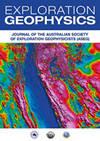Time domain elastic-wave full waveform inversion based on first-order approximate instantaneous frequency
IF 0.8
4区 地球科学
Q4 GEOCHEMISTRY & GEOPHYSICS
引用次数: 1
Abstract
The weak signals of artificial seismic records contain the subsurface medium information that is required in the inversion. But in the full waveform inversion (FWI), the weak signals contribute less to the objective functions. Therefore, how to improve the contribution of the weak signals in the objective functions of FWI is the problem that needs to be solved urgently. The research shows (Ren, D. 1980. Preliminary research on seismic record and instantaneous frequency. Oil Geophysical Prospecting 15 no. 1: 7–21) that instantaneous frequency attributes, which are very sensitive to the changes in subsurface velocity, have the potential to extract the weak signals from the seismic records. However, this frequency can only be estimated from the complex seismic signals. Empirical mode decomposition (EMD) method has been widely used in signal analysis so as to estimate the instantaneous frequency, but it is difficult to be applied in FWI due to the huge computation. In order to solve this problem, the instantaneous frequency is replaced with the first-order approximation of the exponential frequency in FWI. In this paper, the objective functions of the first-order approximate exponential frequency FWI (FRE-EFWI) in elastic waves and the source terms of its back propagation formula were derived. Besides, the FRE-EFWI method was proved to improve the contribution of the weak signals in the objective functions of FWI. In addition, the correctness and effectiveness of the method were demonstrated by the examples of FWI.基于一阶近似瞬时频率的时域弹性波全波形反演
人工地震记录的微弱信号包含了反演所需的地下介质信息。但在全波形反演(FWI)中,弱信号对目标函数的贡献较小。因此,如何提高弱信号在FWI目标函数中的贡献是目前迫切需要解决的问题。研究表明(Ren, D. 1980)。地震记录与瞬时频率的初步研究。石油地球物理勘探15期(1: 7-21)瞬时频率属性对地下速度变化非常敏感,有可能从地震记录中提取微弱信号。然而,这个频率只能从复杂的地震信号中估计出来。经验模态分解(EMD)方法已广泛应用于信号分析中以估计瞬时频率,但由于计算量大,难以应用于FWI。为了解决这一问题,在FWI中将瞬时频率替换为指数频率的一阶近似。本文推导了弹性波中一阶近似指数频率FWI (frei - efwi)的目标函数及其反向传播公式的源项。此外,还证明了该方法可以提高弱信号在FWI目标函数中的贡献。最后,通过FWI算例验证了该方法的正确性和有效性。
本文章由计算机程序翻译,如有差异,请以英文原文为准。
求助全文
约1分钟内获得全文
求助全文
来源期刊

Exploration Geophysics
地学-地球化学与地球物理
CiteScore
2.30
自引率
0.00%
发文量
33
审稿时长
>12 weeks
期刊介绍:
Exploration Geophysics is published on behalf of the Australian Society of Exploration Geophysicists (ASEG), Society of Exploration Geophysics of Japan (SEGJ), and Korean Society of Earth and Exploration Geophysicists (KSEG).
The journal presents significant case histories, advances in data interpretation, and theoretical developments resulting from original research in exploration and applied geophysics. Papers that may have implications for field practice in Australia, even if they report work from other continents, will be welcome. ´Exploration and applied geophysics´ will be interpreted broadly by the editors, so that geotechnical and environmental studies are by no means precluded.
Papers are expected to be of a high standard. Exploration Geophysics uses an international pool of reviewers drawn from industry and academic authorities as selected by the editorial panel.
The journal provides a common meeting ground for geophysicists active in either field studies or basic research.
 求助内容:
求助内容: 应助结果提醒方式:
应助结果提醒方式:


